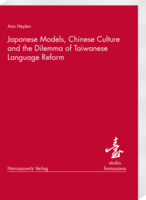|
weitere Titel zum Thema:
Download:
Bitte beachten Sie: Mit digitalen Produkten in Ihrem Warenkorb
wird die Bezahlung nur per PayPal möglich. Der Download dieser Produkte wird bereitgestellt, wenn die Bezahlung bestätigt ist. The history of language modernization in East Asia has been discussed in literature covering Japan, China, Korea, Vietnam, but to date the case Taiwan remained unexplored. The increasing prominence of Taiwan on the international scene necessitates a deeper understanding of its linguistic culture that is equally prone to the sensitivities and current pattern of globalization. Precisely in this context, the study by Ann Heylen examines the history and nature of language modernization in Taiwan during the Japanese colonial period (1895–1945). Japanese colonization of the island was one of the major currents propelling the discourse on language reform. The colonized elite came to reflect on the state of their spoken and written Chinese languages, and more specifically, the channels by which they adopted contemporaneous models of language.
Focus of attention are three language reform movements that emerged throughout the 1920s and 1930s and the arguments each of them presented in selecting a linguistic norm as an appropriate means to counter the Japanese foreign language imposition and its cultural ideology. These three were the Romanized Taiwanese, Mandarin baihuawen and Written Taiwanese movements. How did they emerge in the colonial context? How significant was the influence of the May Fourth movement and model of Chinese language standardization? What were the major arguments for and against the Written Taiwanese movement? To what extent was each movement tolerated or not by the Japanese colonial authorities, and what was the response of society at large? And last but not least: What is their relevance for present day Taiwanese issues on language and culture in identity formation? |
|||||||||||||||||||||||||||||||||||||||||






